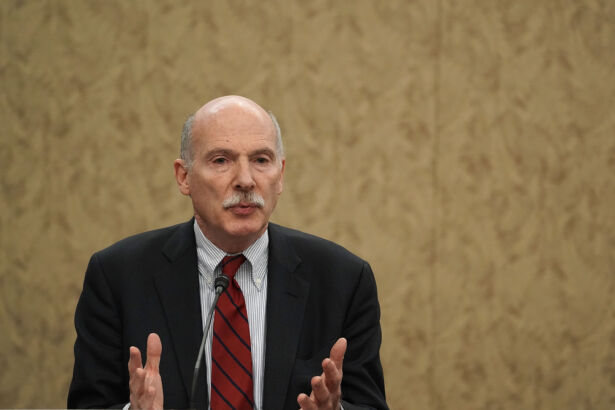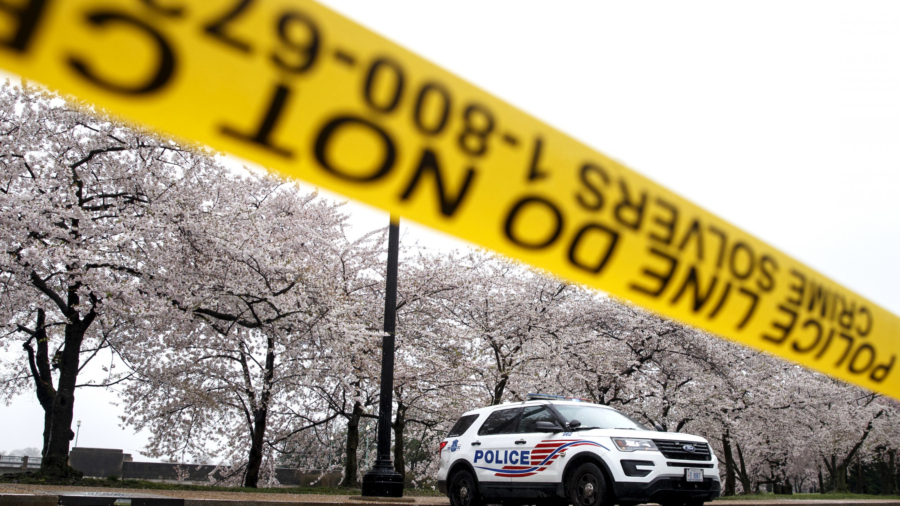Democratic D.C. Council Chairman Phil Mendelson announced at a press conference on Monday that he was withdrawing a controversial criminal code bill that sought to reduce sentences for violent crimes committed in the Capital.
While the Council had passed the Revised Criminal Code Act (RCCA), it was vetoed by D.C. Mayor Muriel Bowser and, on Feb. 9, the House of Representatives introduced a measure to overturn it. The bill was scheduled to face a vote in the U.S. Senate that aimed to block it.
“This morning, I delivered a letter to the Senate withdrawing the criminal code reform commission legislation,” Mendelson told reporters at the legislative press conference on March 6.
Mendelson said that he was withdrawing the measure before the Senate would have a chance to vote on it—which he said would give the Council time to rework the bill before resubmitting it at a future date.
The original D.C. legislation was a rewrite of the District’s criminal code that reduced maximum penalties for certain crimes—including burglaries, robberies, and carjackings—and scrapped a number of mandatory minimum sentences.
The measure received backlash from Republicans and some Democrats who are concerned about the rising crime rate in the nation’s capital. Democratic D.C. Mayor Muriel Bowser had previously vetoed the bill, and President Joe Biden recently signaled that he would sign a Republican-led resolution to block it if one crossed his desk.
“It’s clear that Congress is intending to override that legislation and so my letter, just as I transmit bills for their review, withdraws from consideration the review,” Mendelson said at Monday’s press conference.
In his letter addressed to Vice President Kamala Harris, Mendelson explained that the Home Rule Act requires that before a D.C. Council act can become law, it must first be transmitted to both houses of Congress.
“Since the Senate has not yet taken action on D.C. Act 24-789, my withdrawal of this legislation means that Act 24-789 is not properly before Congress at this time,” he wrote.
Following Mendelson’s move, author of the Senate resolution (pdf) Sen. Bill Hagerty (R-Tenn.) responded with a statement. “The DC Council’s desperate, made-up maneuver not only has no basis in the DC Home Rule Act, but underscores the completely unserious way the Council has legislated,” Hagerty wrote. “No matter how hard they try, the Council cannot avoid accountability for passing this dangerous soft-on-crime bill.”
It was unclear at the time of publication whether the Senate would proceed with the vote to block the RCCA bill.
On March 2, however, President Biden released a statement on Twitter, saying that “if the Senate votes to overturn what D.C. Council did—I’ll sign it.”
Biden qualified his commitment with a reiteration of his support for Washington D.C. becoming a state.
“I support D.C. Statehood and home-rule,” he wrote, “but I don’t support some of the changes D.C. Council put forward over the Mayor’s objections—such as lowering penalties for carjackings.”

The New D.C. Criminal Code’s Chronology
According to the DC Council, all legislation approved by the 13-member body must be reviewed by Congress.
“An approved Act of the Council must be sent to the United States House of Representatives and the United States Senate for a period of 30 days before becoming effective as law (or 60 days for certain criminal legislation),” according to the Council. “During this period of congressional review, the Congress may enact into law a joint resolution disapproving the Council’s Act.”
“If, during the review period, the President of the United States approves the joint resolution, the Council’s Act is prevented from becoming law. If, however, upon the expiration of the congressional review period, no joint resolution disapproving the Council’s Act has been approved by the President, the Bill finally becomes a Law and is assigned a law number.”
On Nov. 15, 2022, the D.C. Council unanimously approved the RCCA.
On Jan. 4, D.C. Mayor Bowser vetoed the bill, but on Jan. 17, the D.C. Council overrode Bowser’s veto with a 12 to 1 vote.
On Feb. 9, the U.S. House overturned (or blocked) the “sweeping rewrite of the criminal code” with a resolution under the D.C. Home Rule Act, led by Rep. Andrew Clyde (R-Ga.) and resulting in a 250 to 173 vote, according to Hagerty’s Feb. 9 statement. Thirty-one House Democrats joined the Republicans in the resolution’s passage.
“The D.C. Council’s radical rewrite of the criminal code threatens the well-being of both Washingtonians and visitors — making our nation’s capital city a haven for violent criminals,” Clyde said in the statement. “In response to this dangerous and severely misguided measure, it’s now up to Congress to save our nation’s capital from itself.”
Also on Feb. 9, Sen. Hagarty introduced a companion resolution in the Senate.
“I implore my colleagues on both sides of the aisle to join in this effort,” Hagarty said in a Feb. 14 press conference about the resolution. “Combatting crime should not be a Republican or a Democrat issue—it should be a commonsense issue.”
On March 2, President Biden said that if the Senate passes the resolution, he would sign it. The RCCA bill was withdrawn on March 6.

